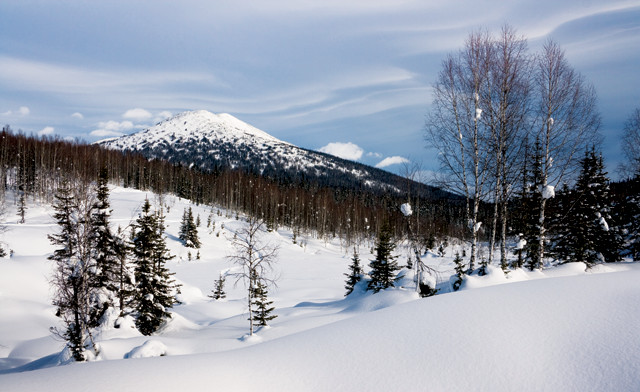
by Sarah Derouin Friday, December 21, 2018

New research suggests that Siberia's anomalously cold winters in recent years may have been caused by melting sea ice in the Barents-Kara Sea. Credit: Dmitry A. Mottl.
The Arctic is warming faster than anywhere else on Earth, and fall sea-ice extents have been trending downward for decades. But while the region is heating up, that northerly warming seems to be having the opposite effect on some midlatitude locations: Parts of Siberia near the Ural Mountains, for example, have had anomalously cold winters in recent decades.
Understanding why some midlatitude areas are cooling while the Arctic is warming is a hotly debated topic. Part of the debate centers on whether the retreat of sea ice can be linked to abnormally cold winters — commonly caused by polar vortices dipping into lower latitudes — on nearby landmasses. Now, researchers have discovered how interactions among atmospheric layers over the Barents-Kara Sea might be the driving force behind Siberia’s recent spate of abnormally frigid winters, and the key lies in the stratosphere.
Previous studies have shown that decreased sea-ice cover in the Arctic can shift stratospheric wind patterns, including the swirling winds of the polar vortex, down toward the troposphere and Earth’s surface. However, the reasons for this shift are not well understood, says Pengfei Zhang, a postdoctoral researcher at Purdue University and lead author of a new study in Science Advances.
Other researchers, Zhang notes, have suggested that Siberia’s extra-chilly winters may be caused by random internal variations within the atmosphere that are unrelated to sea ice. “Our study found that the role of the stratosphere was missed in previous studies,” Zhang says.
Zhang and his team used a general circulation model to simulate the atmosphere over the Barents-Kara Sea and Siberia. Their modeling showed that Arctic sea-ice loss and related Arctic warming influence the stratospheric polar vortex by impacting the behavior of Rossby waves — giant, meandering high-altitude wind patterns, like the jet stream — especially over the Barents-Kara Sea, Zhang says. These changes impact atmospheric circulation and sometimes contribute to an “incursion of cold Arctic air into lower latitudes, resulting in cold anomalies of surface air temperature,” he says. The team found that this influx of cold air followed a “stratospheric pathway” that persists through the winter.
“We were surprised that the contribution of the stratosphere is larger than the tropospheric pathway,” Zhang says, as weather patterns and convection are primarily influenced by the troposphere.
Zhang says that his team’s work proves that the cold winters over Siberia are one result of overall Arctic warming. But anomalously cold winters haven’t been observed over all midlatitude landmasses.
“We have to reconcile the fact that there is a region over Siberia that has experienced wintertime cooling over a period of multiple decades while most other regions have experienced warming,” says Nathaniel Johnson, a climate scientist at Princeton University and NOAA who was not involved with the study.
This study is “a nice advance,” Johnson says. Although the stratosphere may not have much of an impact on day-to-day weather, this study presents a case where the stratosphere can be important to wintertime climates, he says. But more work is needed on the impact of sea-ice loss on remote regions, he says. In any case, it would be good to see more stratospheric representation in climate models.
“Given the important role of the stratosphere in Siberian cold events, seasonal [weather] predictions could be improved if we develop and use a model with a more realistic stratosphere,” Zhang says. He says the group’s next step is to explore the impacts of sea-ice loss on North America.
© 2008-2021. All rights reserved. Any copying, redistribution or retransmission of any of the contents of this service without the expressed written permission of the American Geosciences Institute is expressly prohibited. Click here for all copyright requests.